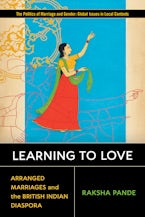Learning to Love moves beyond the media and policy stereotypes that conflate arranged marriages with forced marriages. Using in-depth interviews and participant observations, this book assembles a rich and diverse array of everyday marriage narratives and trajectories and highlights how considerations of romantic love are woven into traditional arranged marriage practices. It shows that far from being a homogeneous tradition, arranged marriages involve a variety of different matchmaking practices where each family tailors its own cut-and-paste version of British-Indian arranged marriages to suit modern identities and ambitions. Pande argues that instead of being wedded to traditions, people in the British-Indian diaspora have skillfully adapted and negotiated arranged marriage cultural norms to carve out an identity narrative that portrays them as "modern and progressive migrants"–ones who are changing with the times and cultivating transnational forms of belonging.
Series Foreword by Péter Berta
Preface and Acknowledgments
1 The Politics of Marriage and Migration in Postcolonial Britain
2 Becoming Modern and British: Enacting Citizenship through Arranged Marriages
3 Continuing Traditions as a Matter of Arrangement
4 Becoming a "Suitable Boy" and a "Good Girl"
5 Learning to Love
6 The Ties That Bind: Marriage, Belonging, and Identity
7 Conclusion
References
Index

